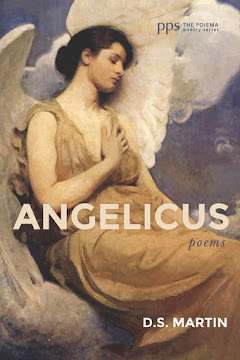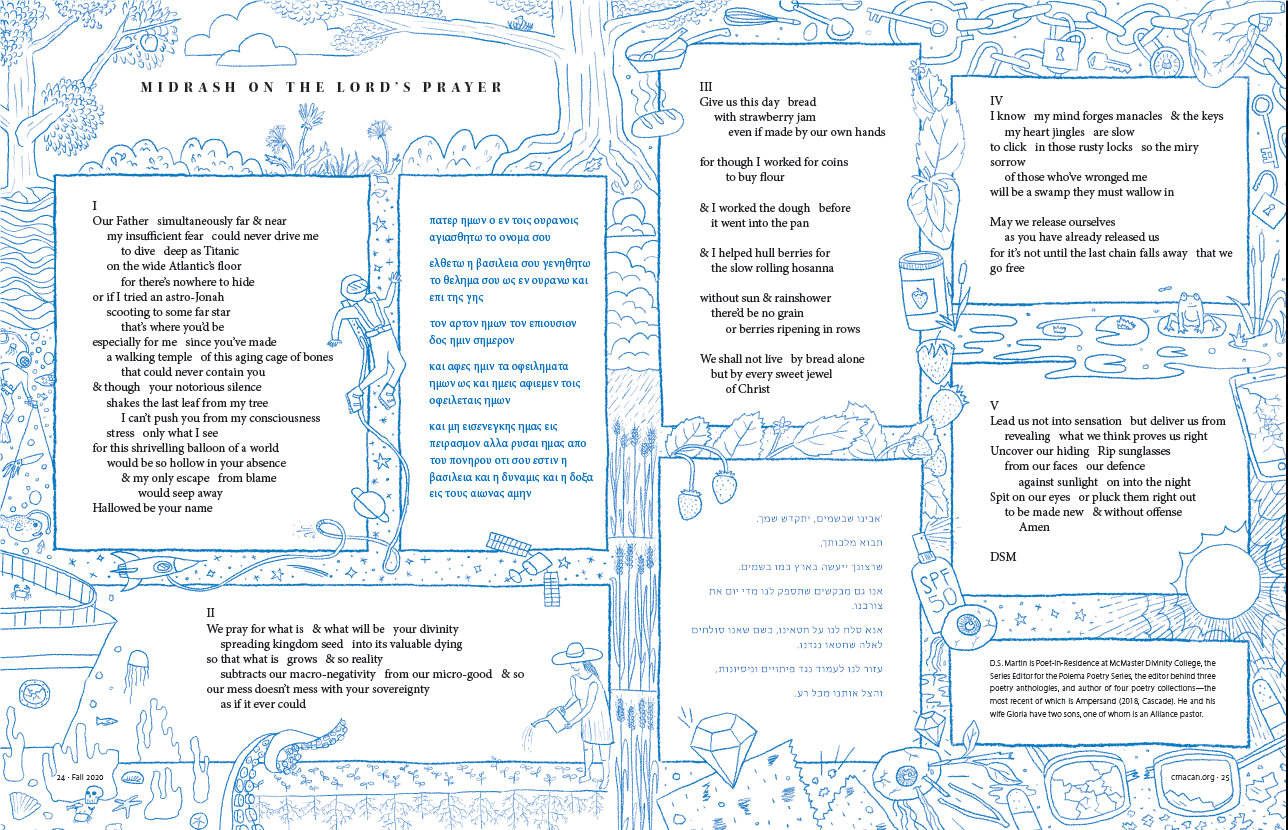Guillaume de Salluste du Bartas (1544—1590) is a French Huguenot, who served in the court of Henri IV, from well before he came to the French throne.
Du Bartas’ divine poetry was appreciated across Europe during the sixteenth and seventeenth centuries. At the turn of that century he was still the most esteemed poet in France, although literary fashions changed later in the 1600s. Because of his Protestant views, his influence was felt much longer in England — where he had made a significant impression on Philip Sydney, Edmund Spenser, and John Milton. James VI of Scotland’s enthusiasm for du Bartas’ verse also spread the poet’s fame.
He also made an impact on the Metaphysical poets. C.S. Lewis wrote in English Literature in the 16th Century, “…no one can point to a moment at which poetry began to be Metaphysical nor to a poet who made it so; but of all poets perhaps Guillaume de Salluste du Bartas… comes nearest to that position.”
The following is from Joshua Sylvester's translation, which appeared in editions from 1608 to 1641, and is part of the first poem from The Divine Weeks (Part 1—Building The World)
from The First Day
No sooner said He, “Be there light,” but lo!
The formless lump to perfect form ‘gan grow,
And all illustred with light’s radiant shine,
Doffed mourning weeds and decked it passing fine.
All hail, pure lamp, bright, sacred and excelling;
Sorrow and care, darkness and dread repelling;
The world’s great taper, wicked men’s just terror,
Mother of truth, true beauty’s only mirror—
God’s eldest daughter! O, how thou art full
Of grace and goodness! O, how beautiful!
Since thy great Parent’s all-discerning eye
Doth judge thee so, and since His Majesty—
Thy glorious Maker—in His sacred lays
Can do no less than sing thy modest praise.
This post was suggested by my friend Burl Horniachek.
Entry written by D.S. Martin. His latest poetry collection is Ampersand (2018, Cascade). His books are available through Amazon, and Wipf & Stock, including the anthologies The Turning Aside, and Adam, Eve, & the Riders of the Apocalypse.
The Kingdom Poets blog is a resource of poets of the Christian faith, regardless of background; there is no attempt made to assess orthodoxy, but simply to present poets who speak profoundly of faith in God.
KINGDOM POETS
D.S. Martin posts here every Monday. Since February of 2010, Kingdom Poets has grown to become an extensive archive — from across the centuries, around the world, and varying church backgrounds.
Contact: don@dsmartin.ca
Contact: don@dsmartin.ca
About Me

- D.S. Martin
- D.S. Martin's books include: Angelicus (2021), Ampersand (2018), Conspiracy of Light: Poems Inspired by the Legacy of C.S. Lewis (2013), Poiema (2008) and the chapbook, So The Moon Would Not Be Swallowed (2007). He is the Series Editor for the Poiema Poetry Series from Cascade Books, and Poet-in-Residence at McMaster Divinity College.
THE TURNING ASIDE (click cover)
Pages
The Poiema Poetry Series
D.S. Martin is the Series Editor for this series from Cascade Books. Click here for the latest.
Search This Blog
Alpha Index A-B
- Joseph Addison(2)
- Anna Akhmatova(2)
- Susan Alexander
- Dante Alighieri(2)
- Gillian Allnutt
- Julia Alvarez
- Ambrose of Milan
- Chris Anderson
- Sophia Andresen(2)
- Maya Angelou
- Anselm of Canterbury
- Asaph
- Thomas Aquinas
- Cliff Ashby
- Anne Askew
- W.H. Auden(2)
- Margaret Avison(2)(3)
- William Baer(2)
- Philip James Bailey
- William Baldwin
- Laura Battiferri
- Charles Baudelaire
- Jill Peláez Baumgaertner(2)(3)
- James K. Baxter
- Richard Baxter
- Doug Beardsley
- Bruce Beasley
- John Beaumont
- Joseph Beaumont
- Gustavo Adolfo Bécquer
- Hilaire Belloc
- The Beowulf Poet
- Bernard of Clairvaux(2)
- Daniel Berrigan
- Wendell Berry(2)(3)
- John Berryman(2)
- Ursula Bethell(2)
- John Betjeman(2)(3)
- Elizabeth Bishop
- William Blake(2)(3)
- Veniamin Blazhenny
- Marianne Bluger
- Boethius
- Dietrich Bonhoeffer
- Euros Bowen
- Anne Bradstreet(2)
- Bedřich Bridel
- Robert Bridges(2)
- Philip Britts
- Joseph Brodsky(2)
- Anne Brontë(2)
- Charlotte Brontë(2)
- Emily Brontë(2)
- George Mackay Brown(2)
- Elizabeth Barrett Browning(2)(3)(4)
- Robert Browning(2)(3)
- Johan Nordahl Brun
- Ashley Bryan
- William Cullen Bryant
- Frederick Buechner
- John Bunyan
- Mark S. Burrows
- Jesse Keith Butler
Alpha Index C-D
- Cædmon
- Scott Cairns(2)(3)
- Pedro Calderón de la Barca
- Luis Vaz de Camões
- Tommaso Campanella
- Ernesto Cardenal(2)
- Julia A. Carney
- Abigail Carroll(2)
- Rosalia de Castro
- Catherine of Siena
- Charles Causley
- Catherine Chandler
- Danielle Chapman
- Thomas Chatterton
- Geoffrey Chaucer
- Angelico Chavez
- G.K. Chesterton(2)(3)
- Kelly Cherry
- Susanna Childress
- Agatha Christie
- Amy Clampitt
- John Clare(2)
- Jeremy Clarke
- Paul Claudel
- Jane Tyson Clement
- Clement of Alexandria
- Clement of Rome
- Jack Clemo
- Lucille Clifton(2)
- Mary Elizabeth Coleridge
- Samuel Taylor Coleridge(2)
- Vittoria Colonna
- Columba of Iona
- Tony Conran
- Peter Cooley
- Maryann Corbett
- Robert Cording(2)
- Pierre Corneille
- Joseph Cotter
- Susan Cowger(2)
- William Cowper(2)
- Pamela Cranston
- Richard Crashaw(2)
- Barbara Crooker(2)(3)
- Fanny J. Crosby
- Countee Cullen(2)
- E.E. Cummings
- Stephen Cushman
- Cyrillona
- Zach Czaia
- Pádraig J. Daly(2)
- Rubén Darío
- King David
- Joy Davidman
- Donald Davie
- Pennar Davies
- Brad Davis(2)(3)
- Todd Davis
- Madeline DeFrees(2)
- John F. Deane(2)
- Thomas Dekker
- Pier Giorgio Di Cicco(2)
- Charles Dickens
- Emily Dickinson(2)(3)
- John Ditsky
- John Donne(2)(3)
- Brian Doyle
- Dragan Dragojlović(2)
- The Dream Of The Rood
- John Dryden
- Guillaume de Salluste du Bartas
- Sandra Duguid
- Paul Laurence Dunbar
- William Dunbar
Alpha Index E-I
- Meister Eckhart
- Maura Eichner(2)
- T.S. Eliot(2)(3)(4)
- Ephrem of Edessa
- Joanne Epp(2)
- Kristina Erny
- Ralph Erskine
- William Everson(2)
- Frederick William Faber
- B.H. Fairchild
- John Meade Falkner
- Mildmay Fane
- Leslie Leyland Fields
- Robert Fitzgerald
- Carolyn Forché
- Brett Foster(2)(3)
- Francis of Assisi
- S.Trevor Francis
- Jen Stewart Fueston
- Carla Funk
- Nola Garrett
- David Gascoyne
- Ida Gerhardt
- Dana Gioia(2)
- Diane Glancy(2)
- Luis de Góngora
- H.F. Gould
- Richard Greene
- Jane Greer
- Gregory of Nazianus
- Catharina Regina von Greiffenberg(2)
- Ann Griffiths
- Guido Guinizelli
- Malcolm Guite(2)(3)
- Jeff Gundy
- Gwenallt
- Daffyd ap Gwilym
- Hadewijch
- Donald Hall(2)
- Nathaniel Lee Hansen
- Dave Harrity
- Joseph Hart
- Kevin Hart
- Olav H. Hauge
- Ivan Head
- Seamus Heaney(2)(3)
- John Heath-Stubbs
- Reginald Heber
- Matthew E. Henry
- George Herbert(2)(3)(4)
- Mary Sidney Herbert
- Robert Herrick(2)(3)
- Luann Hiebert
- Hildegard of Bingen(2)
- Geoffrey Hill(2)
- Graham Hillard
- Hugo von Hofmannstal
- Laura Reece Hogan(2)
- David Brendan Hopes
- Gerard Manley Hopkins(2)(3)
- George Moses Horton
- Robert Hudson
- Langston Hughes(2)
- Victor Hugo
- Isaiah
- Sally Ito(2)
Alpha List J-K
- Drew Jackson
- Max Jacob
- Jacopone da Todi
- King James I
- Jean Janzen(2)
- Mark Jarman(2)
- David Lyle Jeffrey
- Rod Jellema(2)
- Elizabeth Jennings(2)(3)
- John of Damascus
- John of the Cross
- Fenton Johnson
- Lionel Johnson
- Pauline Johnson(2)
- Samuel Johnson
- George Johnston
- Gordon Johnston
- John the Apostle
- William Jolliff
- Bobi Jones
- David Jones(2)
- Richard Jones(2)
- Ben Jonson(2)
- Juana Ines de la Cruz
- Jukichi Yagi
- A.M. Juster
- Alexis Kagame
- Anna Kamieñska
- Mary Karr(2)
- Julia Spicher Kasdorf(2)
- Patrick Kavanagh(2)
- John Keble
- Margaret Kellermann
- Thomas á Kempis
- Thomas Ken
- Jane Kenyon(2)(3)
- Aleksey Khomyakov
- Søren Kierkegaard
- Kim Hyunseung
- Henry King
- Jane King
- Thomas Kingo
- Charles Kingsley(2)
- Sarah Klassen(2)(3)
- Daniel Klawitter
- Laurie Klein (2)
- Ralph Knevet
- Edvard Kocbek
- Jan Kochanowski
- Philip C. Kolin(2)
- Pavel Kolmačka
- Ku Sang
- Afua Kuma
- Theophilus Kwek
Alpha Index L-M
- Paul Lake
- Alphonse de Lamartine
- William Langland
- Andrew Lansdown(2)
- Aemilia Lanyer
- Sarah Law
- Robert Lax
- Sydney Lea(2)
- John Leax(2)
- Aaron Lee
- John Robert Lee(2)
- Karen An-hwei Lee(2)
- Li-Young Lee
- Madeleine L'Engle(2)
- Luis de León
- Kenneth Leslie
- Denise Levertov(2)(3)(4)
- Peter Levi
- C.S. Lewis(2)(3)
- Gwyneth Lewis
- Li Bifeng
- Li Hao
- Vachel Lindsay
- Anne Locke
- Henry Wadsworth Longfellow(2)
- Robert Lowry
- Dulce María Loynaz
- Luke (Joseph A. Brown)
- Martin Luther(2)
- Mario Luzi
- John Lydgate
- Thomas Lynch
- George MacDonald(2)
- Marjorie Maddox
- Jennifer Maier
- Hannah Main-van der Kamp
- Osip Mandelstam
- Sergiu Mandinescu
- Maurice Manning
- Paul Mariani(2)(3)
- Svetlana Marisova
- Andrew Marvell(2)
- John Masefield
- Cotton Mather
- George Matheson
- Evelyn Mattern
- James McAuley(2)
- Janet McCann
- Susan McCaslin
- Shane McCrae
- Walt McDonald
- Marilyn Chandler McEntyre
- Claude McKay
- Elizabeth Melville
- Thomas Merton(2)
- Philip Metres
- Alice Meynell
- Nontsizi Mgqwetho
- Michelangelo
- Adam Mickiewicz
- John Milbank
- Calvin Miller
- Vassar Miller(2)
- Wilmer Mills
- Czeslaw Milosz(2)
- John Milton(2)(3)
- Gabriela Mistral
- James Montgomery
- Lucy Maud Montgomery
- Julie L. Moore(2)
- Marianne Moore(2)
- Thomas Moore
- Pamela Mordecai
- Eduard Mörike
- A.F. Moritz
- Annabelle Moseley
- Moses
- Edwin Muir(2)(3)
- Les Murray(2)(3)
- Paul Murray
- Benjamin Myers
- Jason Myers
Alpha Index N-R
- Marguerite de Navarre
- Marilyn Nelson(2)
- Muriel Nelson
- Amy Nemecek
- Jae Newman
- John Henry Newman
- John Newton
- Norman Nicholson(2)
- Mark A. Noll
- Miho Nonaka
- John Norris
- Kathleen Norris(2)
- Cyprian Kamil Norwid
- Novalis
- Alfred Noyes
- O Antiphons
- Angela Alaimo O’Donnell
- John O’Donnell
- Mary Oliver(2)(3)
- Micheal O'Siadhail(2)
- Richard Osler
- Tadhg Gaelach Ó Súilleabháin
- Wilfred Owen
- Eric Pankey
- Pantycelyn
- Jay Parini
- Boris Pasternak
- Evangeline Paterson(2)
- Coventry Patmore(2)
- Alan Paton
- Patrick of Ireland
- Patrick’s Rune
- Barbara Colebrook Peace
- The Pearl Poet
- Charles Péguy
- Eugene H. Peterson(2)
- Petrarch(2)
- Marjorie Pickthall
- Edith Lovejoy Pierce
- János Pilinszky
- F.W. Pitt
- Ruth Pitter(2)
- Joseph Mary Plunkett
- John Poch
- Alexander Pope(2)
- Anne Porter(2)(3)
- Marie J. Post
- David E. Poston
- Adélia Prado(2)
- Aurelius Prudentius
- Francis Quarles
- Salvatore Quasimodo
- Paul Quenon
- Francisco de Quevedo
- Miklós Radnóti
- Walter Raleigh
- Shann Ray
- Jennifer Reeser
- John Reibetanz
- Jacobus Revius
- Charles G.D. Roberts
- Michael Symmons Roberts(2)(3)
- Jenny Robertson
- Edwin Arlington Robinson
- W.R. Rodgers
- Romanos the Melodist
- Óscar Romero
- Pierre de Ronsard
- Elizabeth Rooney
- Christina Rossetti(2)(3)(4)
- Dante Gabriel Rossetti
- Juan Ruiz
- Tania Runyan(2)(3)
Alpha Index S-Z
- Nicholas Samaras(2)
- Charles Sangster
- Siegfried Sassoon
- Vedanyakam Sastri
- Dorothy L. Sayers
- Jane Clark Scharl
- Angeline Schellenberg(2)
- David Scott
- F.R. Scott(2)
- Léopold Sédar Senghor
- Martha Serpas(2)
- William Shakespeare(2)
- Luci Shaw(2)(3)
- Robert B. Shaw
- Edward Shillito
- Betsy Sholl
- Philip Sidney
- Javier Sicilia
- Robert Siegel(2)(3)
- Angelus Silesius
- Anya Krugovoy Silver(2)(3)
- Simeon the New Theologian
- C.H. Sisson
- Edith Sitwell
- John Slater(2)
- Christopher Smart
- A.J.M. Smith
- Gerard Smyth
- Edith Södergran
- Vladimir Solovyov
- Aleksandr Solzhenitsyn
- Sons of Korah
- Marin Sorescu
- Anne Southwell
- Robert Southwell(2)
- Lisa Russ Spaar
- Horatio Gates Spafford
- Edmund Spenser(2)
- William Stafford(2)
- Sofia Starnes
- Marjorie Stelmach(2)
- Kenneth Steven
- Wallace Stevens
- Jack Stewart
- Harriet Beecher Stowe
- Jacob Stratman
- G.A. Studdert Kennedy(2)
- John Suckling
- Sweeney Astray
- Joshua Sylvester
- Margo Swiss(2)
- Mary Szybist
- John Banister Tabb
- Novica Tadić(2)
- Torquato Tasso
- Allen Tate
- Edward Taylor
- John Taylor
- Alfred Tennyson(2)
- Teresa of Avila
- John Terpstra(2)(3)
- Gerhard Tersteegen
- Theophan the Recluse
- Dylan Thomas
- R.S. Thomas(2)(3)
- Thomas of Celano
- Dunstan Thompson
- Francis Thompson(2)
- Edwin Thumboo
- Narayan Vaman Tilak
- J.R.R. Tolkien
- Thomas Traherne(2)(3)
- Tomas Tranströmer(2)
- R.C. Trench
- Diane Tucker
- Frederick Goddard Tuckerman
- Steve Turner
- Katharine Tynan
- Anne Lee Tzu Pheng
- Giuseppe Ungaretti
- John Updike
- Sheldon Vanauken
- Jean Vanier
- Henry Vaughan(2)(3)
- Paul Verlaine
- François Villon
- Brian Volck
- Joost van den Vondel
- Roger Wagner
- G.C. Waldrep
- Jeanne Murray Walker(2)
- Edmund Waller
- Chad Walsh
- Izaak Walton
- Walter Wangerin Jr.(2)
- Vernon Watkins
- Rowland Watkyns
- Isaac Watts
- Ann Weems
- Franz Werfel
- Charles Wesley(2)
- Phillis Wheatley(2)
- John Wheelwright
- George Whipple(2)
- John Greenleaf Whittier(2)
- Richard Wilbur(2)
- Oscar Wilde
- Claude Wilkinson
- Mischa Willett
- Charles Williams
- Rowan Williams(2)
- Waldo Williams
- William Carlos Williams
- Paul Willis(2)(3)(4)
- Christian Wiman(2)
- Karol Wojtyla
- David Wright
- Franz Wright(2)
- Wu Li
- Pamela S. Wynn
- Marly Youmans
- Yun Tongju
- Adam Zagajewski(2)
- Ed Zahniser
- Irene Zimmerman
- James A. Zoller
Blog Archive
Followers
Popular Posts
-
Patrick’s Rune was written by an unidentified author, in the ancient Bearla Feine Irish dialect, as part of a longer piece called “St. Patri...
-
Norman Nicholson (1914—1987) is an English poet, born in the town of Millom, Cumbria, where he lived his entire life—with the exception of a...
-
Vassar Miller (1924—1998) is the author of ten poetry books, including If I Had Wheels or Love (1991) her collected poems. She has a strong...
-
Asaph has had twelve of the psalms in the Old Testament Psalter (Psalms 50 and 73-83) attributed to him. He was one of King David's chie...
-
Petrarch (Fransesco Petrarca) (1304–1374) is an Italian poet who has significantly influenced western verse. His sonnets were particularly a...
-
Buile Suibhne is an ancient Irish tale of a king, often referred to as Mad Sweeney, who is driven insane by the curse of St. Ronan. Suibhne&...
-
Paul Mariani is a contemporary American poet, who was born in New York City. He holds a Chair in Poetry at Boston College, and is known for ...
-
Sandra Duguid grew up in western New York State. For twenty years she taught literature, composition and creative writing at colleges in the...
-
Sarah Klassen is a Manitoba poet and writer who has won several awards, including the Gerald Lampert Award for her debut collection Journey ...
-
John Meade Falkner (1858—1922) is a British novelist and poet. He was also quite successful in business, becoming the chair of the arms manu...
Recognition

Kingdom Poets was selected for the Liebster Award in 2013 by Carolyn Wilker, and for the Top 25 Christian Poetry Blogs by Feedspot in 2018.

















